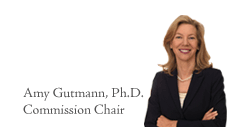In May 2010, scientists at the J. Craig Venter Institute announced that they had created the world's first self-replicating synthetic (human-made from chemical parts) genome in a bacterial cell of a different species. Intense media coverage followed, and the announcement ricocheted across the globe within hours as proponents and critics made striking claims about potential risks and benefits of this discovery and whether it amounted to an early-stage example of "creating life."
In response, President Barack Obama asked the Commission to review the developing field of synthetic biology and identify appropriate ethical boundaries to maximize public benefits and minimize risks. The Commission approached this task through inclusive and deliberative engagement with a wide variety of sources, including scientists, engineers, faith-based and secular ethicists, and others who voiced, as expected, sometimes conflicting views on the science, ethics, and social issues surrounding synthetic biology. Through public meetings in Washington, D.C., Philadelphia, and Atlanta, the Commission created a forum for open dialogue to hear and assess competing claims about the science, ethics, and public policy relating to synthetic biology.
- Read media coverage on the issue.
- Read the F.A.Q.'s.
- Read the press release.
- Read the New Directions: The Ethics of Synthetic Biology and Emerging Technologies report.


